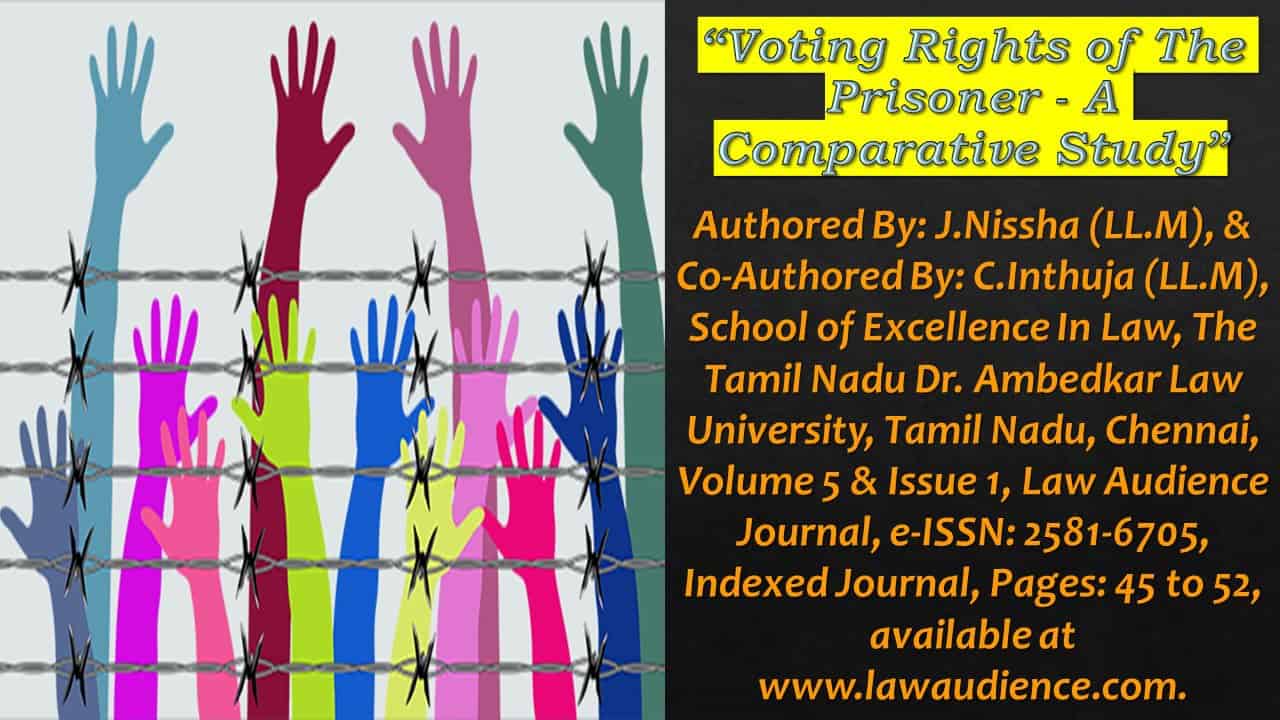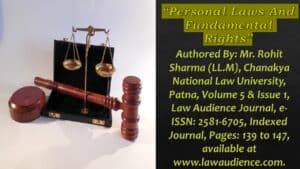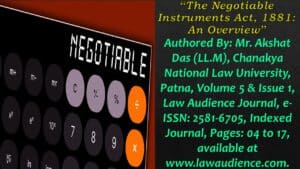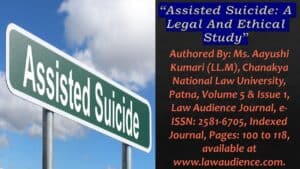Click here to download the full paper (PDF)
Authored By: J.Nissha (LL.M), & Co-Authored By: C.Inthuja (LL.M), School of Excellence In Law, The Tamil Nadu Dr. Ambedkar Law University, Tamil Nadu, Chennai,
Click here for Copyright Policy.
ABSTRACT:
“The right to vote is a fundamental tenet of every democracy. When exercised, this right, which is provided to the nation’s citizens, determines the elected representative who will be a part of the government. India is proud to be known as the world’s largest democracy, and the right to vote is the very thing that pushes the boundaries of democracy. Articles 19(1)(a) and 326 of the Indian constitution, as well as Section 62(5) of the Representation of the People Act of 1951, define the right to vote for any citizen over the age of 18. The prisoners, on the other hand, are denied the right to vote. In light of this, the purpose of this paper is to compare and contrast the rights of prisoners around the world to exercise their right to vote with those guaranteed to them by the Indian constitution and determine whether or not the Supreme Court’s restriction on this right is reasonable. The doctrinal research approach is the foundation of this study shall be established through doctrinal research”.
Keywords: Right of Prisoners, Voting Rights, Democracy, Constitution, Representation of People Act, 1951.
I. INTRODUCTION:
In a democracy, a person’s vote is given the utmost weight in an election because it is the only factor that determines who will form the government through the election of representatives and sets the country’s course. In a nation like India, which is divided along lines of religion, culture, caste, wealth, and status, the right to vote creates uniformity regardless of an individual’s personal identity. The value of a person’s vote is one, and this applies to everyone, no matter who they are. This right isn’t given to everyone at once; rather, there are some requirements that must be met before a person can vote. The requirements for becoming a voter are outlined in Article 326 of the Indian Constitution. The requirements for Universal Adult Suffrage are that a person must be a citizen of India and not be prohibited from exercising their right to vote by any law because of mental illness, unethical behavior, or non-residence. According to international treaties like the Universal Declaration of Human Rights and the International Covenant on Civil and Political Rights, the government must grant and protect voting rights to ensure that everyone can participate in government. The voters’ right is in line with the aforementioned stipulations. Having said that, when it comes to prisoners’ voting rights, incarcerated people in many nations around the world are prevented from exercising their right to vote, as well as their right to participate in the formation of the government and exercise their voting rights. A restriction known as “Prisoner Disenfranchisement,” which translates to civil death or forfeiture, is imposed on prisoners serving a prison sentence for a conviction in many nations. This was given to those who committed heinous crimes or crimes involving moral depravity, which led to the prisoners losing certain rights, including the right to vote.
II. POSITION IN INDIA: RIGHT OF PRISONERS TO VOTE:
As previously mentioned, universal adult suffrage is a requirement for election to the Lok Sabha and state legislative assemblies. The constitutional right to free speech and expression is guaranteed by article 19(1), and the right to vote is an expression of that right that has been derived from it.[1] This provision was challenged in the case of Anukal Chandra Pradhan vs. Union of India[2], where the supreme court held that the right to vote is not an absolute right and that it can be exercised only with reference to the conditions met under the statute that stipulates so. The challenge cannot be made under the premise of violation of fundamental right because the right to vote is a statutory right. However, the prisoners have been barred from voting in an election by section 62(5) of the Representation of People Act The court that upheld the provision’s constitutionality stated that the act accomplishes its intended goal of decriminalizing politics, discussed the practical challenges of holding elections in prison, and concluded that the petition must fail.
III. POSITION IN OTHER COUNTRIES:
III.I SOUTH AFRICA:
The legal system in South Africa has emphasized the significance of the right to vote by stating the principle that the right to vote is tied to one’s dignity. In August vs. Electoral Commission, it was held that the convicts who enter prison upon sentencing do not forfeit all of their rights; rather, they retain some of the personal rights that are not explicitly excluded by law[3]. This is one of the reasons why the right to vote is based on constitutional values like democracy and dignity[4]. In the subsequent case, five years later, the constitutional validity of the disenfranchisement of prisoners came into question in the case of Minister of Home Affairs vs. NICRO[5], in which the court rejected the state’s argument that the limitation imposed upon the prisoners which bars them from voting due to the logical difficulties faced by the state and the state’s duty to allocate the resources to ensure the law-abiding citizens are enabled to vote, by stating that the state has imposed a blanket ban without supporting any of them.
III.II UNITED STATES:
The fact that felons are prohibited from voting gives the prisoners’ voting rights legal standing. This ban is extended to felons on probation in a number of states, and the rules governing when an ex-convict can vote are very different from state to state.[6] In Vermont and Maine, however, people’s voting rights are protected regardless of whether they were convicted or ex-convicts, and it does not depend on what they did wrong. However, unless they are granted executive clemency[7], individuals who have been found guilty of a felony in Virginia or Kentucky will never be able to vote again. The following arguments are made in favor of felony disenfranchisement:
- Because the crime is a political act and the perpetrator disobeys the law, it makes no sense that the perpetrator should be permitted to participate in the election process that results in the formation of the government.
- Depriving criminals of their right to vote is not in violation of their rights because, by committing a crime, they have forfeited their rights, and it would not be fair to law-abiding citizens if the rights of felons were not taken away.
- By their actions, the felons have demonstrated that they lack virtue, and granting them the right to vote will only lead them to support a candidate who wants to weaken criminal laws. Self-defense is thought to be the purpose of felony disenfranchisement.
- Additionally, the FD is viewed as a potential tool for preventing crime.
III.III HONG KONG:
The governance structure in Hong Kong, a special administrative region in China, is two-tiered. It has a legislative council at the center and a district council at the local level. The Basic Law of the People’s Republic of China’s Hong Kong Special Administrative Region specifies the requirements for a person to be eligible to vote. Article 24 of this act states that a person must register in order to vote in two elections, that they must be at least 18 years old, and that they must live permanently in Hong Kong. A person’s right to vote is a fundamental right that is protected by Basic Law, ICCPR, and BORO. Unless the law specifies that a right may be restricted by the existence of particular conditions, the rights granted by Articles 26 and 39 are unaffected. The Legislative Council Ordinance and the District Council Ordinance, on the other hand, prohibit prisoners serving time from voting. Sections 31(1)(c) and 53(5)(c) of the central acts, the Legislative Council Ordinance, and section 30(d) of the local law, the District Council Ordinance, prohibit ex-convict prisoners from voting in certain circumstances. The right to vote is also denied to those who had been found guilty but had not yet begun serving their sentences. The definition of disqualification outlined by the law applies to this legislation, which is said to be within the scope of the Basic Law. Even though there were previous attempts to amend the law to remove the disqualification, the proposed legislation was never implemented.[8]
III.IV UNITED KINGDOM:
The prisoners can’t vote anywhere in the UK because of the Representation of the People Act of 1983. The following cases must be examined in order to determine the United Kingdom’s position regarding prisoners’ voting rights. This resulted in the case of Hirst v. United Kingdom (2005), in which the Grand Chamber of the European Court of Human Rights determined that Article 3 of the aforementioned law violates the First Protocol to the European Convention on Human Rights.[9] The Hirst judgment had a significant impact, prompting a number of prisoners[10] in Strasbourg, Austria, to file lawsuits to overturn their ineligibility for voting rights. The case of Greens and M.T. vs. United Kingdom dealt with the issue of non-compliance by the government in enforcing the Hirst directions, and the Grand Chamber directed the government to introduce amendments to the legislation under Article 46 within a period of six months from the date of direction. This judgment relied on the judgment given in the case of Hirst and held that a blanket ban on prisoners is to be ruled out and that disenfranchisement should be an exception In the sense that the Greens argue that the disenfranchisement ought to be nullified on the basis of the argument that every individual ought to be granted the right to vote regardless of their classification, the cases of the Greens and Frodl offer two distinct points of view. However, the Frodl decision argues that disenfranchisement should be an exception and should be linked to the nature of the offense. Despite this, the government of the United Kingdom has responded slowly to amending the legislation.[11]
III.V CANADA:
The right to vote is protected by Section 3 of the Canadian Charter of Rights and Freedoms because it is regarded as a fundamental right and as being essential to democracy. The term “basic rights” refers to rights that cannot be revoked. After the supreme court ruled that the law prohibiting prisoners from voting was unconstitutional, the federal government amended the Canada Elections Act in 1993. Voting rights for prisoners serving less than two years were made possible by the amendment. The federal government attempted to limit prisoners’ voting rights with this amendment. In the case of Sauvé vs. Canada (Chief Electoral Officer), this was challenged. This landmark decision is referred to not only by Canadian subordinate courts but also by international courts. In this instance, the government made the case that even though the act restricts the rights of prisoners who have been sentenced to more than two years, the reasons for promoting respect for the law and civic responsibility make this restriction justifiable. The court ruled that voting is a citizen’s fundamental right that cannot be violated arbitrarily, and that any act restricting the fundamental right must have a strong justification that meets a specific legal test. The government’s arguments were rejected by the court, which upheld the prisoners’ right to vote.[12]
IV. RECOMMENDATIONS:
As noted in the preceding progressive judgments, the right to vote must not be restricted on any basis because the probable reasons for the prisoners’ inability to exercise their right to vote do not comply with the legal requirements for depriving the right. The right to vote is the very essence of democracy. The Supreme Court ruled in Challa Ramkrishnan Reddy vs. State of Andhra Pradesh that inmates do not lose their constitutional rights once they are in jail.[13] The argument that inmates lose their personal rights is not recognized by law, so it stands on an idea that is not mandated by law. Furthermore, the claim that the restriction acts as a deterrent to criminals is not supported by evidence that in practice it does. Section 62(5) of the 1951 Representation of the People Act contradicts provision 8(3) of the same act, which states that a person sentenced to less than two years in prison should be allowed to vote. However, the former section declares the prisoner to be a civil dead person and denies them the right to vote.[14] Section 62(5) ought to be repealed or declared unconstitutional because it violates the basic structure doctrine and causes an unreasonable classification under article 14 of the constitution.
The constitutional right to vote must be elevated to the level of the fundamental right. The primary reason for this is that it is in line with democratic principles and the basic structure doctrine.[15] The right must be made available to all prisoners, regardless of the nature of their crime, the length of their sentence, or anything else. It is only right to declare that prisoners have the right to vote[16] because the world is moving toward reformative punishments, the judiciary has implemented this principle, and the trend is on the rise.
V. CONCLUSION:
When the right to vote is exercised diligently by the people, democracy remains fundamentally intact. When a right like this is guaranteed and protected by both the government and the constitution, democracy is strengthened. While countries like the United States, Australia, Germany, and China have chosen to grant prisoners the right to vote but have imposed restrictions based on the length of time served, countries like Canada and South Africa have chosen to grant prisoners the right to vote and have restricted any laws that seek to impose bans without falling within the specific legal justification. It is past due for India, the world’s largest democracy, to shift its stance from restricting the right of prisoners to vote to promoting that right.
Cite this article as:
J.Nissha & C.Inthuja, “Voting Rights of The Prisoner – A Comparative Study”, Vol.5 & Issue 1, Law Audience Journal (e-ISSN: 2581-6705), Pages 45 to 52 (4th March 2023), available at https://www.lawaudience.com/voting-rights-of-the-prisoner-a-comparative-study/.
Footnotes:
[1] N. Prakash & M.Yashasvi, Disenfranchisement of prisoners, COCHIN UNIVERSITY LAW REVIEW 334 (1998).
[2] Anukal Chandra Pradhan v. Union of India, AIR 1997 SC 2814 (India).
[3] August v. Electoral Commission, (1999) 3 SA I (CC), 18-19.
[4] Ntusi Mbodla, Should Prisoners Have a Right to Vote, 46 J. AFR. L. 92 (2002).
[5] Minister of Home Affairs v. NICRO, (2004) 5 BCLR 445 (CC).
[6] Michael J. Cholbi, A Felon’s Right to Vote, 21 LAW & PHIL. 543 (2002).
[7] Akashdeep Singh, Denial of Right to Vote to the Prisoners in India: A Critical Analysis, 5 INT’l J.L. MGMT. & HUMAN. 1216 (2022).
[8] Wing Hong Chui, Prisoners’ Right to Vote in Hong Kong: A Human Rights Perspective, ASIAN JOURNAL OF SOCIAL SCIENCE, 35, 179–94 (2007).
[9] Alison Kesby, Prisoner Voting Rights and the Effect of Hirst v. United Kingdom (No. 2) on National Law, THE CAMBRIDGE LAW JOURNAL, 66, 258–60 (2007).
[10] Brandon Rottinghaus, Incarceration and Enfranchisement: International Practices, Impact and Recommendations for Reform, CHARLES AND KATHLEEN MANATT DEMOCRACY STUDIES FELLOW INTERNATIONAL FOUNDATION FOR ELECTION SYSTEMS, 22 (2003).
[11] Briant & Sophie. “The Requirements Of Prisoner Voting Rights: Mixed Messages From Strasbourg.” THE CAMBRIDGE LAW JOURNAL, 70, 279–82 (2011).
[12] McLachlin CJ in Sauve v. Canada Chief Electoral Officer, 2002 SCC 68
[13] State of Andhra Pradesh v. Challa Ramkrishnan Reddy, AIR 2000 SC 2083 (India)
[14] Representation of People Act, Section 8(3).
[15] G. Harshavarthan, Prisoner’s Right to Vote, 20 SUPREMO AMICUS 176 (2020).
[16] Akashdeep Singh, Denial of Right to Vote to the Prisoners in India: A Critical Analysis, 5 INT’L J.L. MGMT. & HUMAN, 1216 (2022).
References:
- Ikenna ESQ, Anyanwu, “Prisoners Fundamental Right to Vote: The UK Example”, JOURNAL OF LAW AND GLOBAL POLICY, (2018).
- Rottinghaus, Brandon, “Incarceration and Enfranchisement: International Practices, Impact and Recommendations for Reform”, CHARLES AND KATHLEEN MANATT DEMOCRACY STUDIES FELLOW INTERNATIONAL FOUNDATION FOR ELECTION SYSTEMS, (2003).
- Sidhic, Abubacker S., “A Critical Analysis on Right to Vote of Prisoners”, INDIAN JOURNAL OF LAW AND LEGAL RESEARCH, (2021).
- The International Covenant on Civil and Political Rights.
- Verma, Paridhi. “Rights of Prisoners under Indian Law”, PEN ACCLAIMS, (2018).
- In Simmons v. Galvin, 130 SCt 2428 (2010) (US Supreme Court) The Supreme Court ordered the Solicitor General to ‘express the views of the United States’ on whether laws that take away the right to vote from people in prison or on parole can be challenged under the Voting Rights Act as racially discrimination.
- Bill of Rights Ordinance (Hong Kong).
- Canada Elections Act Charter of Rights and Freedom (Canada).
- Commonwealth Electoral Act 1918 (Australia).
- District Council Ordinance (Hong Kong).
- Electoral Provisions Bill 1981 (Hong Kong).
- Representation of the People Act 1983 (The United Kingdom).
- Legislative Council (Electoral Provisions) Bill 1985 (Hong Kong).
- Legislative Council Ordinance (Hong Kong).



